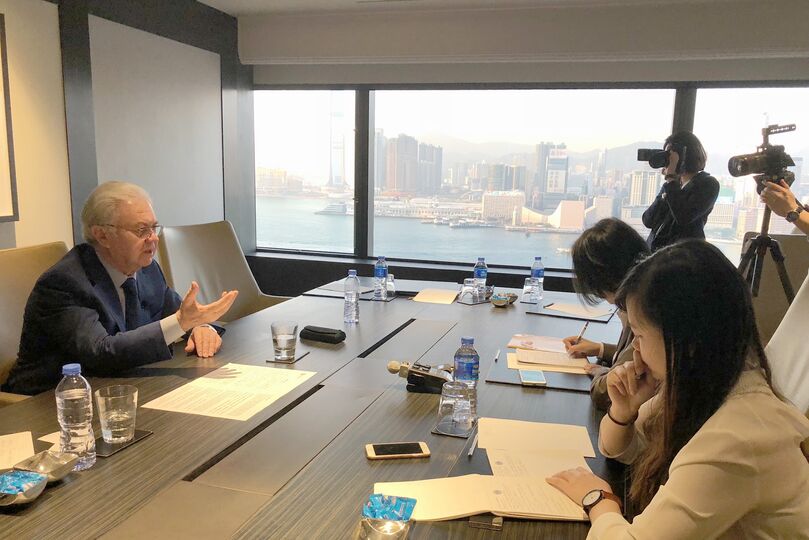In the run-up to an international conference on the development of regional economic cooperation in Hong Kong, the SCO Secretary-General met with representatives of the local media.
During the interview, Rashid Alimov answered numerous questions from journalists and spoke about the status and prospects of multifaceted cooperation within the SCO in the light of the agreements reached at the Qingdao summit and following the SCO Heads of Government Council meeting in Dushanbe.
Responding to a question from editor-in-chief of Maxsourcemedia Cheng Yuxi about the comparison of the SCO with the NATO military-political bloc in the Western media, the Secretary-General stressed that the SCO is not and never had plans to become a military organisation directed against anyone. He explained that the SCO is an organisation of multifaceted cooperation, built on the principles of mutual respect and a true partnership model of interaction based on the unshakable principles of the "Shanghai spirit." "There is no hierarchy in the SCO, no dominance, no coercion, the Organisation is based on equal mutually beneficial partnership and cooperation, and all decisions are made by consensus," the SCO Secretary-General accentuated.
At the same time, Rashid Alimov added that "the presence of a terrorist threat dictates the need to step up joint work to eradicate it. In this regard, within the SCO, mechanisms of interaction of special services are established and efficiently functioning, large-scale anti-terrorism exercises are regularly held, the point of which is directed against this universal evil. " "The main task of the Organisation is to provide the necessary conditions for the ongoing joint development and prosperity of the peoples living in the SCO space," the Secretary-General said.
Rashid Alimov also pointed out that the SCO carries out multifaceted work in the sphere of politics and security, trade, economic and humanitarian interaction. "The entire range of subjects on the Organisation's agenda is extremely positive, aimed at creative international cooperation," he stressed.
When asked by South China Morning Post correspondent Kinling Lo about the results of joint work within the SCO after India and Pakistan joined it, the Secretary-General said: "The success of the SCO summit in Qingdao, where 23 joint documents were adopted that determined the main directions of the eight states' cooperation development is evidence of the successful integration of new members into the association."
"Today we are not saying that India and Pakistan are the new members. These two respected and authoritative countries are full-fledged members, fully integrated into the system of the SCO interaction," Rashid Alimov explained.
During the interview, economic cooperation within the SCO was also addressed, primarily in the context of developing initiatives, development programmes and integration efforts in Eurasia.
In this regard, the Secretary-General said that "extensive work is now being implemented in the region. Efforts are progressing on linking national development strategies and integration processes within the EAEU with efforts to implement the Belt and Road Initiative; there is a search going on for optimal options for the integration of each country's economic development strategies in the interests of the development of the Eurasian region. Of course, all countries are striving, ultimately, to sustainable progressive development. The whole region benefits from this, new growth points appear. The SCO is a universal platform that allows for dialogue on a wide range of matters, which opens up unique opportunities for all member states," Rashid Alimov noted.
"It is important that all countries in the SCO are focused on dialogue and the search for joint solutions, all the SCO member states know how to listen, hear and be receptive to one another," the SCO Secretary-General stressed.
